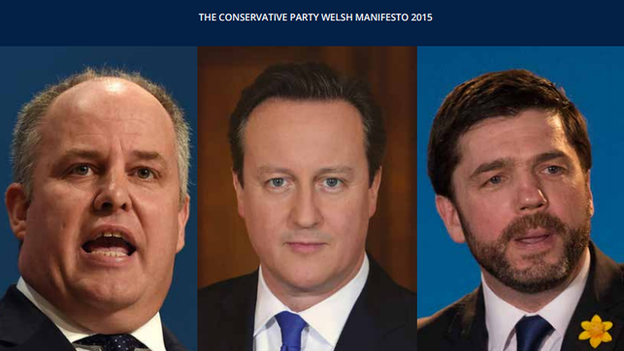Manifestos past and present: What to look out for
- Published
- comments

Remember him? David Cameron at the heart of the Conservatives' Welsh manifesto in 2015.
One of the many treats of a snap election - only seven weeks to go, folks - is that I get the chance to re-read manifestos from two years ago. I do this so you don't have to.
The Brexit vote means that many of the pledges then - membership of the single market, anyone? - are no longer worth the paper they were written on.
But other (as yet undelivered) commitments are worth re-visiting as we anticipate the arrival of the 2017 documents.
Shall we start with the Barnett formula, that spending mechanism that oppositions often promise to scrap but governments somehow find indispensable?
Labour said it would "ensure that Wales continues to benefit through the Barnett formula and the addition of a funding floor"., external It also promised to "strengthen devolution once again, guaranteeing fair funding for Wales, as well as powers over policing, energy, transport and elections."
The Conservatives said they would "introduce a Barnett funding floor and deliver fair funding for Wales". , external
Labour lost the election, so didn't get a chance to deliver the promise (will they return to the policing issue this time?). The Conservatives won and there is now a funding floor. But is there fair funding?
'Challenges'
Welsh Secretary Alun Cairns argues that the funding floor ensures "that relative levels of funding for Wales will not fall below 115% of comparable funding in England". , externalWe can still expect plenty of arguments about whether that comparable funding is fair - and Labour under Jeremy Corbyn is committed to higher public spending.
Brexit brings bigger financial challenges. The Conservatives say they're committed to funding farming and some EU projects until 2020. What happens then? They won't be able to hide.
Labour have said, external they will make up any shortfall in EU structural funding "into the 2020s and beyond", although it's not entirely clear where the money is coming from. Will they make a similar pledge for agriculture? First Minister Carwyn Jones said last month he feared the end of farming subsidies after Brexit. We should find out shortly what a Jeremy Corbyn-led government would intend to do about that.
'Lagoon'
What about plans for a pioneering tidal lagoon at Swansea? The Conservatives promised: "As part of our long-term economic plan for the whole of Wales we will continue to support growth opportunities right across our nation, including the new super prison in Wrexham, the Wylfa Nuclear plant in Anglesey, the Tidal Lagoon project in Swansea and the new City Deal for Cardiff."
The long-term economic plan may now be a historical slogan, but what about that lagoon? The Department for Business, Energy and Industrial Strategy is still looking at a favourable report, external into the scheme by a former Conservative energy minister. With a manifesto imminent, the Conservatives cannot hide behind that review forever.
What doesn't make the manifestos may be as significant as what does feature in them. Philip Hammond's first Budget unravelled after it emerged that it broke a 2015 commitment. He will be looking for a vaguer manifesto that offers more economic wriggle room. Will the Conservatives retain the "triple lock" pledge that increases the state pension by at least 2.5%? (Labour say they will).
I've focused on the Conservatives and Labour here as they are the likeliest to wield power after June 8 - the Liberal Democrats and Plaid Cymru support the lagoon, the pension triple lock and higher public spending in Wales. I'll revisit some of the issues when we see the manifestos from all the main parties.